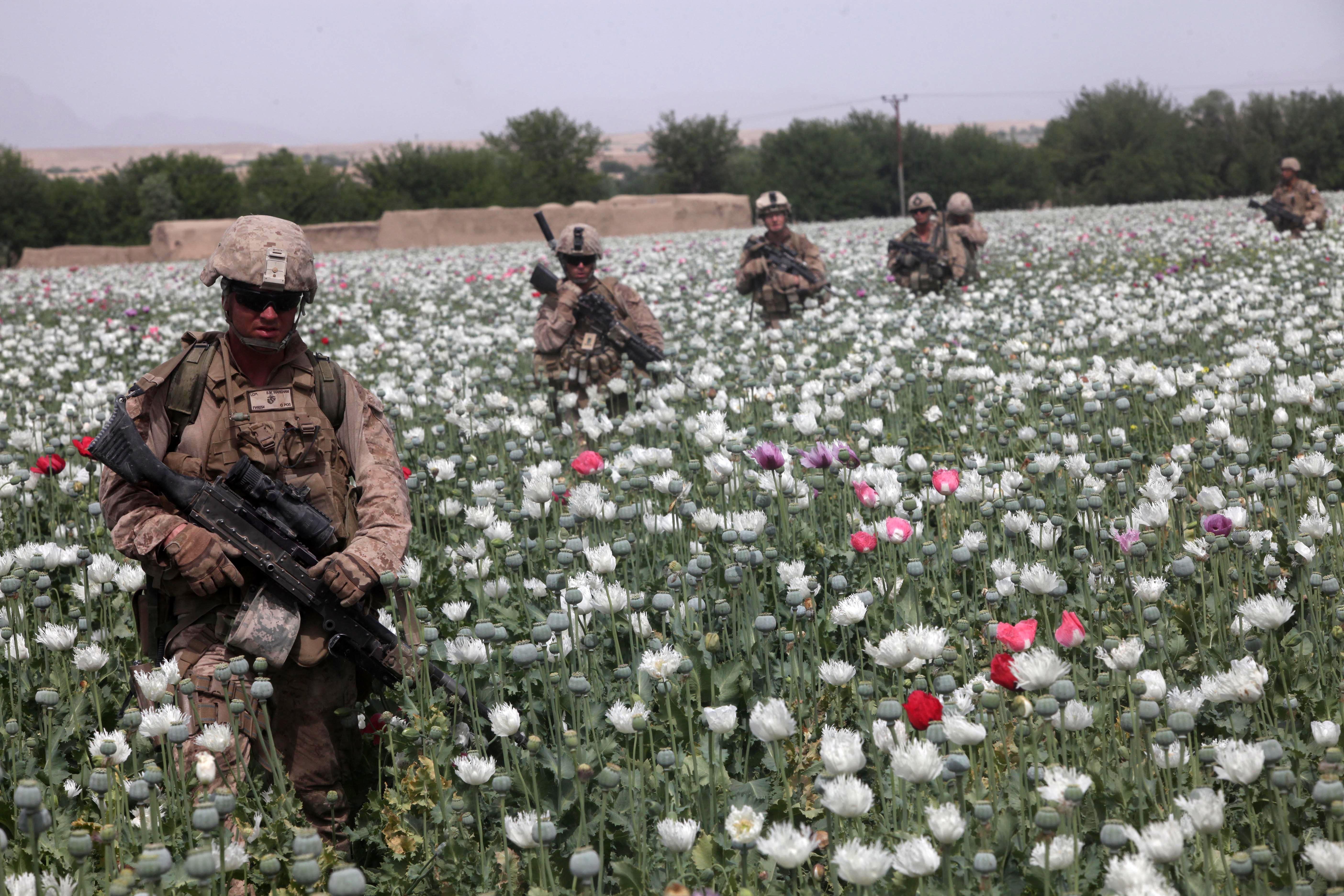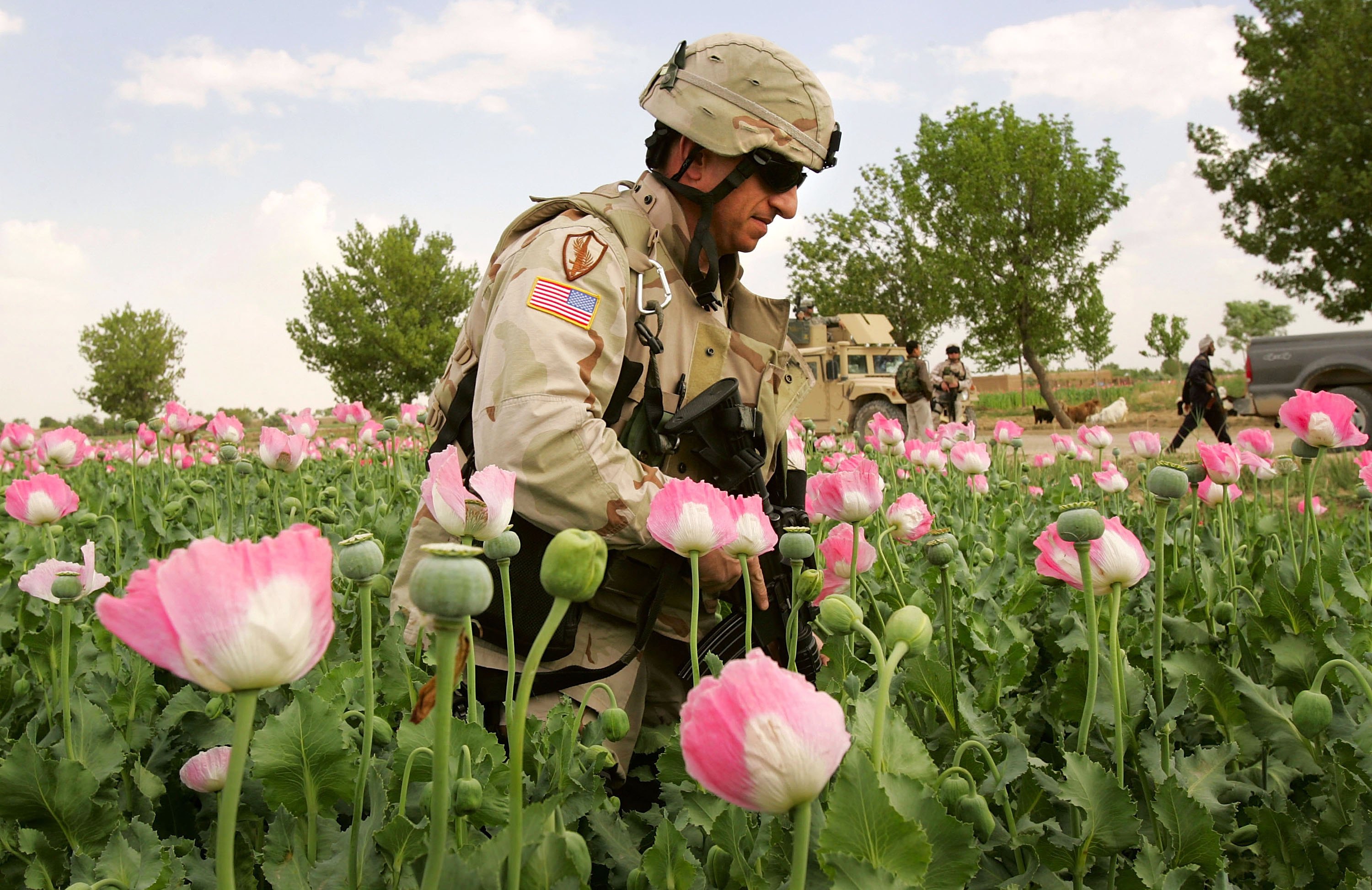Afghanistan’s Opium Business Boomed Under US Occupation
Before the U.S. invaded Afghanistan in 2001, around 82,000 hectares of Afghanistan cultivated poppy, the plant that produces opium which can be turned into heroin and other opiates. United Nations and U.S. estimates put the current poppy crop at around 224,000 hectares. According to the UN, that number is up 37 percent from 2019. The U.S. spent $8 billion trying to eradicate the plant in Afghanistan only to watch as it became the most profitable crop the country produced. Afghanistan now produces 82 percent of the world's supply, according to the UN
Like other U.S. efforts in Afghanistan (and, separately, the war on drugs), the war against poppy is a complete and utter failure. Not only did the Pentagon fail to eradicate the drug-producing plant, it created the perfect conditions for it to flourish. The reasons why are well documented and simple to understand. Both the United Nations Office on Drugs and Crime and the Special Inspector General for Afghanistan Reconstruction have produced dozens of reports detailing the failure of drug interdiction in the country.
War created the perfect conditions for poppy cultivation. It's a visually unique plant that requires a lot of land, and processing it for consumption or transport creates a distinct smell. It's difficult to hide. The instability that results from a foreign invasion fosters the necessary environment to produce opium," Dan Grazier, a former Marine Corps captain who served in Afghanistan and Iraq and Military Fellow at the Project on Government Oversight, told Motherboard on the phone.
To produce opium in payable quantities you need either a really ineffective government or you need to pay a lot of people to look the other way," Grazier said. Our invasion created conditions for both. We destabilized the government and pumped billions of dollars into the country. There was plenty of ready cash around to pay off the people producers needed to pay off to look the other way."
 U.S. Marines patrolling a poppy field in 2012. U.S. Marines photo.
U.S. Marines patrolling a poppy field in 2012. U.S. Marines photo. According to a 2018 SIGAR study of poppy cultivation in Afghanistan, the U.S. lacked a clear understanding of the plant and what it meant to the farmers who grew it. And, like so many other issues in Afghanistan, the strategy around how to handle the plant constantly changed. Our analysis reveals that no counternarcotics program led to lasting reductions in poppy cultivation or opium production," SIGAR said. Eradication efforts had no lasting impact, and eradication was not consistently conducted in the same geographic locations as development assistance. Alternative development programs were often too short-term, failed to provide sustainable alternatives to poppy, and sometimes even contributed to poppy production."
Emblematic of this failure is a clip of Geraldo Rivera on Fox News interviewing a Marine in the early days of the war that regularly circulates online. In the clip, a soldier explains to Rivera why he is guarding a farmer's poppy fields, and why farmers there are more interested in growing poppy than cucumbers or watermelon like the U.S. wanted them to.We are tolerating the cultivation of the opium because we know that if we were to destroy it now, the population would turn against the Marines and it would be a real security risk," Rivera said.
In the clip, Rivera brandished a hand carved poppy scraper, a tool used in cultivation, and explained that the Marines had bought as many as they could find. I want them off the street," the Marine told Rivera. The idea is that we don't want to harvest the poppy. We want to turn the poppy over and put in some wheat, cotton, cucumber, watermelon. Some great stuff they grow out here."
Poppy cultivation exploded after the invasion and it was good business for Afghans. According to SIGAR, by 2017 poppy cultivation alone was estimated to provide up to 590,000 full-time equivalent jobs, more than the number of people employed by the Afghan National Defense and Security Forces."
Conditions in the U.S. and Europe laid the groundwork for an incredible demand for opium. The booming sale of opiates like hydrocodone, fentanyl, and oxycontin created new opium customers. When people lost prescriptions or wanted a bigger high, they turned to heroin and Afghanistan's poppy fields were ready to meet the demand. If someone buys heroin in Russia or Europe, there's a good chance it came from a poppy plant in Afghanistan. SIGAR also estimated that 90 percent of heroin seized in Canada came from Afghan poppies.
A few years into the war, the U.S. began to attempt counternarcotics initiatives and discovered that many of its Afghan allies were involved in the trade. Everyone was making so much money there was no incentive for Afghans to work with the Americans to eliminate the plant. In 2005, DEA and Afghan police pulled 9 metric tons of opium out of the offices of the then governor of Helmand Province.
From 2004 to 2008, the Pentagon started to focus on poppy eradication. The British had previously tried destroying crops and paying Afghans in the trade who lost wages. The U.S. attempted aerial spraying of the poppy plants with herbicides. This also made the Afghans mad and fostered tension between coalition forces and their Afghan allies.
 U.S. Army poppy eradication force in 2006. Getty Images photo.
U.S. Army poppy eradication force in 2006. Getty Images photo. Following Obama's surge in 2009, the counternarcotics strategy changed. Poppy cultivation did fall in some areas, but this was mostly due to the thousands of American troops now patrolling the countryside. Instead of destroying the fields and paying off farmers, Americans worked with farmers to teach them how to plant other crops and provided subsidies for the growing of things like soybeans and wheat. This also failed.
The reality is that poppy is a high demand crop that's almost always sold for cash. Landowners, sharecroppers, and itinerant workers that make up the agricultural labor force in Afghanistan make a lot of money cultivating poppies. Growing the plant is a path out of grinding poverty for some in Afghanistan, and there's little reason for a farmer or their workers to switch a field from a lucrative crop like poppy to something like wheat.
Worse, there was no coherent strategy from the top, and military leaders in the field would sometimes take it upon themselves to conduct drug interdiction missions. In Spring 2010, the U.S. Marine Corps implemented a program of compensated eradication called the Marajh Accelerated Agricultural Transition Program," SIGAR said in a recent report.
This provoked an outcry among those in International Narcotics and Law Enforcement and the U.K. government who viewed previous compensated eradication efforts as failures," SIGAR said. Despite these objections, U.S. military commanders were able to pursue this and other counterdrug programs in their command areas, regardless of wider strategy objects or previous failed efforts."
I don't know how effective we were, but we would fire Hellfire Missiles at these mats on the ground where they were drying the drugs."
It was a process Grazier witnessed first hand when he was in Afghanistan. I don't know how effective we were, but we would fire Hellfire Missiles at these mats on the ground where they were drying the drugs," he said. A Hellfire Missile is a surface-to-air missile used in precision drone strikes. They weigh around 100 pounds and cost $150,000 each.
As American troops began to leave, the DEA and international partners began to lose interest in counternarcotics in the country. Afghanistan was too complicated, and American strategy there too inconsistent to get anything done. In one province, aid workers would be bribing landowners into growing soybeans while one province over Marines were launching precision strikes on production facilities.
America's war in Afghanistan was a tragedy that set the perfect conditions for an explosion in opium production. As we look back at our misadventure in Afghanistan it's important to understand that there are second and third order effects to an invasion," Grazier said. This is another great cautionary tale about why we need to do absolutely everything possible to avoid these kinds of conflict in the future."
The future of the poppy in Afghanistan is unknown. Seeking a normalization of relations with the rest of the world in 2000, Taliban banned cultivation of the plant outright. Just like when the U.S. went to war against the poppy, the Taliban faced opposition from Afghan farmers after the ban. Also, during the twenty years of U.S. occupation, the Taliban learned the value of the drug as both a means of quick cash. The Taliban understands Afghanistan better than the U.S. ever did and it knows that banning the crop will hurt people in the rural provinces.